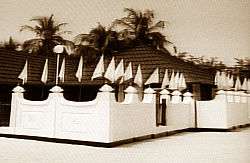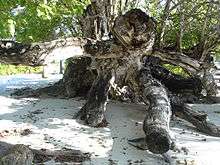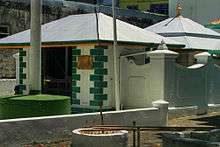Muhammad Thakurufaanu Al Auzam
As-Sulṭaan al-Ghaazee Muhammad Thakurufaanu al-A'uẓam (Dhivehi: އައްސުލްޠާން އަލްޣާޒީ މުޙައްމަދު ތަކުރުފާނު އަލްއަޢުޡަމް) (death August 26, 1585) or As-Sultan Ghazi Muhammad Bodu Thakurufaanu ruled over the Maldive Islands from 1573 to 1585 AD. He was a captain, environmentalist and a military strategist. He is considered as the national hero of the Maldives for driving out the Portuguese who ruled over the Maldives from 1558-1573 after killing Sultan Ali VI in Malé. His victory is commemorated in the Maldives as Qaumee Dhuvas or National Day. He was also the first Maldivian king to form the 'Lashkaru (a unified military body).[1].
| Muhammad Thakurufaanu Al Auzam | |||||
|---|---|---|---|---|---|
| Sultan of the Maldive Islands, Katheeb of Utheemu | |||||
| Reign | 1573 to 1585 AD | ||||
| Predecessor | Andiri Andirin regent of King Dom Manoel | ||||
| Successor | Sultan Ibrahim Kalaafaan (son of Muhammad Thakurufaanu) | ||||
| Born | January 16, 1535 Utheemu, Maldives | ||||
| Died | August 26, 1585 Malé, Maldives | ||||
| Burial | |||||
| Spouse | Rehendiye Goyye | ||||
| Issue | Sultan Ibrahim Kalaafaan (son) | ||||
| |||||
| House | Utheemu | ||||
| Dynasty | Utheemu dynasty | ||||
| Father | Katheebu Husain of Utheemu | ||||
| Mother | Lady Amina Dio | ||||
Early years
Muhammad Thakurufaanu was the son of a khatib, Husain of Utheemu in Thiladhummathi Atoll and Amina Dio of Ihavandhoo. Muhammad Thakurufan learned hevikan(Martial Arts)
Defeat of the Portuguese
After killing Sultan Ali IV, the Maldives was ruled by Andiri Andirin and his Portuguese invaders. Andiri Andirin was a regent of the (Sultan Hassan IX) who was the first Maldivian and the only member of its royalty to renounce Islam and convert to Christianity, later upon his deposition he took refuge in Goa, India.[1]
After the invasion, the Portuguese ruled most cruelly over the Maldive islands in a period which the history describes as
‘‘A time when intolerable enormities were committed by the invading infidels, a time when the sea grew red with Maldivian blood, a time when people were sunk in despair…’’
To bring an end to this, Muhammad Thakurufaanu, left the Maldive Islands with his brothers Ali and Hasan to Maliku off the coast of India in the Laccadive Archipelago. The three Utheemu brothers built the ship Kalhuoffummi.[2] It is said that Muhammad Thakurufaanu received a lot of help from the renowned Maroshi Raaveribe (toddy-tapper) in his fight for national independence. It was his job to mend and maintain the sail of the Kalhuoffummi - the ship used in the 'battle' and supply water to the vessel every time it docked at Maroshi, which was an important port during this fight. The sails of the ship were made on the island of Maroshi, Shaviyani Atoll. This island is historic as it has the tree that grew from the Kaani Mudi (a raw wooden post) used to make the sail of Kalhuoffummi. It is also the largest tree of its kind in the country, and probably the oldest as well.[1]
They, three brothers landed on a different island every night, fought the Portuguese and set sail into the ocean before daybreak. They reached the capital island Malé on the night before the day fixed by the Portuguese garrison of Andiri Andirin for the forcible conversion of the inhabitants to Christianity, on the penalty of death for non-compliance. The Utheemu brothers along with other Maldivians who were determined to die for their country and faith, slew the whole Portuguese garrison and gained independence for the country from its invaders. Andiri Andirin was killed by a musket shot of Muhammad Thakurufaanu himself.[1]
Aftermath
After killing the Andiri Andirin, as per a treaty he got refuge from Ali Raja of Cannanore, India. Muhammad Thakurufaanu's base of operation was Maliku under the sovereignty of Cannanore. The Ali Raja demanded dominion over the Maldives, as promised to him by the Muhammad Thakurufaanu. However, Muhammad Thakurufaanu did not honor this promise. The nature of the relationship between Muhammad Thakurufan and the Ali Raja of Cannanore was outlined in a letter sent by a later Ali Raja, Mariambe Ali-Adi Raja Bibi, to the Sultan Muhammad Mueenuddine I of the Maldives. The letter was dated Friday 17 Jamada-el-oula Anno Hegirae 1243 (7 December AD 1827). According to the letter Muhammad Thakurufan had entered into a treaty ceding sovereignty of the Maldives to the Ali Raja of Cannanore in the event Thakurufan was established in power in Male.[3]
Muhammad Thakurufan concluded a treaty with the King Dom Manoel who lives in Goa, in order to ward off the Ali Raja of Cannanore. Although Muhammad Thakurufan was made a regent of King Dom Manoel (as per the treaty), the Maldivians assigned Muhammad Thakurufaanu as the Sultan of the Maldives, no longer recognizing the sovereignty of the self-exiled Christian kings in Goa or their regents. The chronicles report him to have ruled wisely, being just and considerate, protecting the poor, and even solicitous for the people’s interests. Muhammed Thakurufaanu died a natural death on August 26, 1585.[3]
Legacy
British author Royston Ellis's novel A Hero in Time is about the life and adventures of Muhammad Thakurufaanu.[4] The Islamic Centre, largest mosque in the Maldives is named after him.[1]
The army (lashkaru) organized by him has evolved into the Maldives National Defence Force.[5]
 Utheemu Ganduvaru- the historic residence of Sultan Muhammad Thakurufaanu and other rulers of the Utheemu Dynasty.
Utheemu Ganduvaru- the historic residence of Sultan Muhammad Thakurufaanu and other rulers of the Utheemu Dynasty. The historic Kaani tree of Maroshi where the sails of the Kalhuoffummi were sewn.
The historic Kaani tree of Maroshi where the sails of the Kalhuoffummi were sewn. The tomb of Sultan Muhammad Thakurufaanu in Malé.
The tomb of Sultan Muhammad Thakurufaanu in Malé.- The Islamic Centre, the largest mosque in Maldives, Masjid-as-Sultan Muhammad Thakurufaanu al-Auzam is named after him.
See also
- List of Sultans of the Maldives
- Islamic Centre (Maldives)
- Qaumee Dhuvas
- Origin of the Security Force in Maldives
References
- Naseema Muhammad. As-Sultan Qazi Muhamad Thakurufaanu Auzam Siri Savaadheetha Maharadhun. Online publication (http://www.qaumiyyath.gov.mv/history.php)
- "Kalhuohfummi is expected to be completed in December: Home Ministry". VNews. VNews. 25 November 2015. Retrieved 18 March 2016.
- "Maldives Sovereigns from AD 1117". Archived from the original on May 12, 2013.
- Ellis, Royston (2000). A Hero in Time by Royston Ellis. ISBN 9789812321701. Retrieved 2013-02-22.
- "History". MNDF. Archived from the original on February 11, 2012.
- Divehi Tārīkhah Au Alikameh. Divehi Bahāi Tārikhah Khidmaiykurā Qaumī Markazu. Reprint 1958 edn. Male’ 1990.
- H.C.P. Bell, The Maldive Islands, An account of the physical features, History, Inhabitants, Productions and Trade. Colombo 1883, ISBN 81-206-1222-1